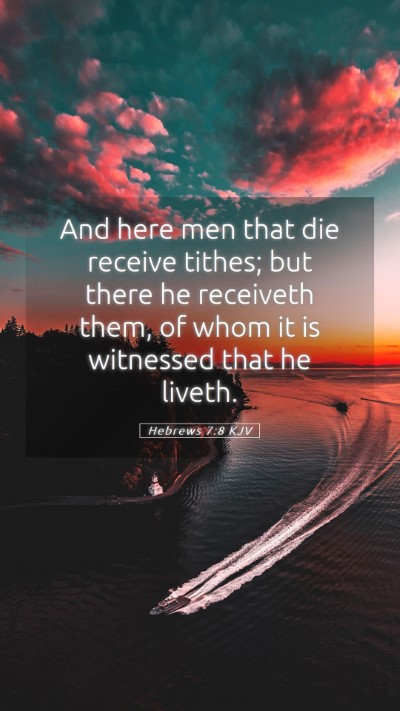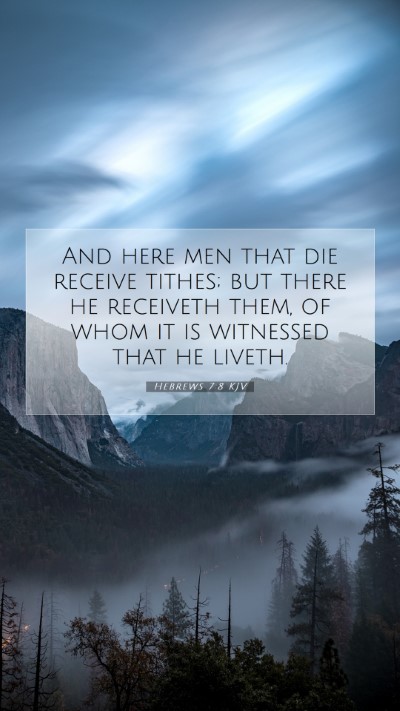Bible Verse Explanation for Hebrews 7:8
Hebrews 7:8 states, "Here mortal men receive tithes; but there he receives them, of whom it is witnessed that he lives." This verse encapsulates profound theological insights regarding the priesthood of Melchizedek and the nature of Christ's eternal priestly ministry.
Understanding Scripture: The Context of Hebrews 7:8
The book of Hebrews is designed to present Jesus as the ultimate fulfillment of the Old Testament priesthood. In chapters 7, the author contrasts the Levitical priests with Melchizedek, who was a priest before the law was given.
-
Matthew Henry's Commentary Insight:
Henry emphasizes the superiority of Melchizedek's priesthood compared to that of Aaron's descendants, noting that while mortal men receive tithes on earth, Jesus, like Melchizedek, receives them in heaven. This indicates a shift from a temporary priesthood to a lasting and eternal priesthood in Christ.
-
Albert Barnes' Interpretation:
Barnes explains that the phrase "but there he receives them" suggests that the recognition of Christ's ministry goes beyond earthly practices, indicating His divine authority and the eternal nature of His priestly office as one who lives forever, unlike the priests of Israel who eventually die.
-
Adam Clarke's Commentary Analysis:
Clarke discusses the historical significance of Melchizedek, examining him as a type of Christ. He points out that Melchizedek's ministry, seen through the lens of tithes, represents a priesthood that does not rely on genealogy but is empowered by God's direct calling, further affirming Christ's unique role in salvation.
Key Themes and Messages
This verse encapsulates several key themes that are vital for understanding its significance:
- Contrast of Earthly and Heavenly Priesthood:
The distinction between earthly priests who die and Christ, who is eternal, teaches believers about the effective and unending nature of Christ’s intercession.
- Melchizedek as a Type of Christ:
Melchizedek serves as a prefigurement of Christ’s priestly role, showing how Old Testament practices were designed to point to the ultimate sacrifice and mediation of Christ.
- Importance of Tithes:
The practice of tithing has spiritual significance; it acknowledges God's sovereignty and indicates that our resources should be dedicated to the service of the Lord and His kingdom work.
Bible Study Insights
For those engaged in Bible study groups or online Bible study, this verse encourages participants to delve deeper into Bible study tools that can enhance their understanding of scripture and its application. Examining the themes in Hebrews can lead to fruitful discussion about the implications of Christ’s eternal priestly ministry and how it relates to contemporary faith practices.
How to Interpret Bible Verses
Understanding difficult Bible passages, such as Hebrews 7:8, involves a thorough examination of historical context, literary structure, and theological implications:
- Historical Context:
Recognize the audience of Hebrews, predominantly Jewish converts struggling with returning to old practices. This context helps clarify why the author emphasizes the superiority of Christ's priesthood.
- Literary Structure:
Note how the argument develops throughout the chapter, effectively using Melchizedek's story to illustrate deeper truths about Jesus' role.
- Theological Implications:
This verse not only affirms the uniqueness of Christ’s priesthood but also assures believers of their secure position before God through faith in Jesus.
Application of Hebrews 7:8
Applying Bible verses to daily life requires recognizing the relevance of Christ’s eternal priesthood. Believers are encouraged to:
- Trust in the assurance that Christ intercedes for them.
- Embrace a spirit of generous giving, understanding that all we have belongs to God.
- Encourage others in faith by sharing the profound truths of Christ's eternal role.
Cross References
This verse is closely related to the following cross-references:
- Genesis 14:18-20: The account of Melchizedek blessing Abraham and receiving tithes.
- Psalm 110:4: A prophecy concerning the priestly nature of the Messiah in the order of Melchizedek.
- Hebrews 5:6: The establishment of Jesus as a high priest according to the order of Melchizedek.
Conclusion
In summary, Hebrews 7:8 conveys profound truths about the nature of Christ's eternal priesthood and its significance in the life of the believer. Through various biblical commentaries, we explore the deeper meanings and applications of this verse, providing a comprehensive understanding that enriches personal and communal Bible study.


